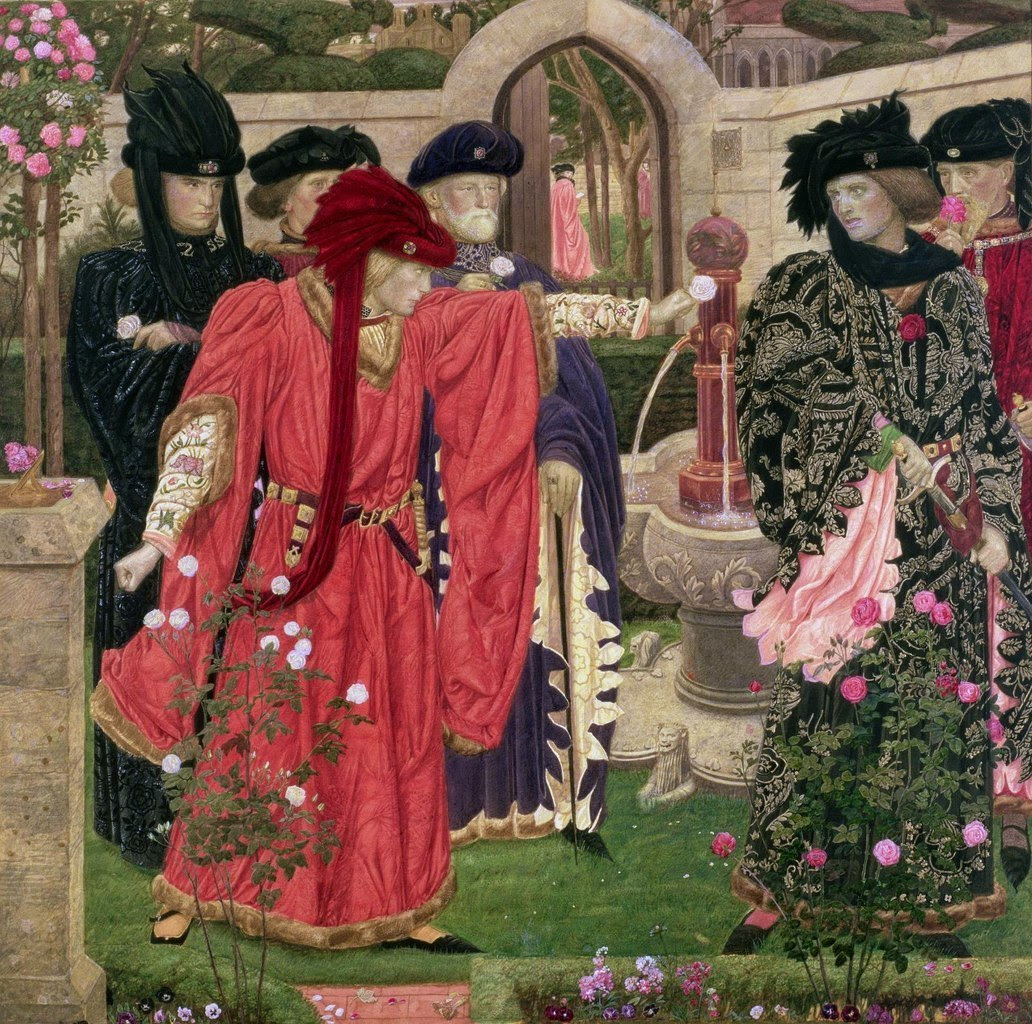The battle itself, fought in the streets of St Albans, the royal standard raised then abandoned in the market square, lasted little over half an hour. Three prominent noblemen were killed. Henry VI was wounded. Yorkist propaganda got its first real work out. The Earl of Warwick’s reputation was made.
Tag archieven: Margaret of Anjou
The Wars of the Roses/[NevillFeast]/The 1st Battle of St Albans: A Warwick! A Warwick!
Reacties uitgeschakeld voor The Wars of the Roses/[NevillFeast]/The 1st Battle of St Albans: A Warwick! A Warwick!
Opgeslagen onder Divers
The Wars of the Roses/[NevillFeast]/Letter from York, Warwick and Salisbury to Thomas Bourchier, Archbishop of Canterbury, 20 May 1455
Written in Royston, this letter was delivered to Archbishop Thomas Bourchier in London while the king was on his way to Leicester. John Say delivered it at Watford, though not into the king’s hands as York hoped. This is a long letter, and pretty dense, so I’m posting it with a translation below. (Translation from British History online, Parliamentary Rolls, Henry VI, 1455. http://www.british-
As members of the Archbishop’s family were split between the king’s forces and York’s, it would have been in his interests to try and broker a peaceful end to the very tense situation.
The letter has been described as ‘propaganda’, which it was certainly used for after the fact. I don’t doubt, however, that the three lords were genuinely concerned about their safety should the meeting at Leicester go ahead without them. There was a flurry of letters during the days leading up to the first battle of St Albans, all intended for the eyes of the king and none of them (apparently) reaching him. York blamed Somerset for withholding them and, according to the Fastolf Relation, Buckingham admitted to Mowbray Herald that Henry hadn’t seen them. Whether anything would have changed had the king read the letters is, of course, impossible to know.
Reacties uitgeschakeld voor The Wars of the Roses/[NevillFeast]/Letter from York, Warwick and Salisbury to Thomas Bourchier, Archbishop of Canterbury, 20 May 1455
Opgeslagen onder Divers
The Wars of the Roses/[NevillFeast]/Letter of Richard Neville, Earl of Warwick to King Edward IV
In historical fiction, Warwick is often portrayed as impatient (at the least) with Edward IV from the very start. Impatient, contemptuous and imperious. This letter suggests something quite different.
Reacties uitgeschakeld voor The Wars of the Roses/[NevillFeast]/Letter of Richard Neville, Earl of Warwick to King Edward IV
Opgeslagen onder Divers
The Wars of the Roses/Aftermath[From Susan Higginbotham ”In Their Own Words”]/Letter of Henry VII to His Mother Margaret of Beaufort
[Source: Original Letters Illustrative of English History, H. Ellis, ed., series 1, vol. 1]
S. B. Chrimes in his biography states that this letter, written to Margaret, Countess of Richmond, was probably written in 1501. Note the charming postscript, in which Henry apologizes for not writing more often and cites
his worsening eyesight as an excuse.
Reacties uitgeschakeld voor The Wars of the Roses/Aftermath[From Susan Higginbotham ”In Their Own Words”]/Letter of Henry VII to His Mother Margaret of Beaufort
Opgeslagen onder Divers
The Wars of the Roses/[From Susan Higginbotham ”In Their Own Words”/Letter of Richard III to His Mother, Cecily Neville Duchess of York
[Source: The Unpopular King: The Life and Times of Richard III by Alfred Owen Legge. The letter can also be found in Rosemary Horrox and P. W. Hammond, eds., British Library Harleian Manuscript 433. Gloucester: Richard III Society, 1979.]
This letter to Cecily, Duchess of York, was written on June 3, 1484. William Colyngbourne, named in the letter, later became famous for the treasonous rhyme, “The Cat, the Rat, and Lovel our dog / Ruleth all England under a Hog,” which he nailed to the door of St. Paul’s Cathedral on July 18, 1484. His chief offense, however, was to write to Henry Tudor to ask him to invade England. Colynbourne was tried and convicted in December 1484. For his execution, he was hung and cut down while still alive, after which his bowels were cast into a fire.
Reacties uitgeschakeld voor The Wars of the Roses/[From Susan Higginbotham ”In Their Own Words”/Letter of Richard III to His Mother, Cecily Neville Duchess of York
Opgeslagen onder Divers
The Wars of the Roses/[From Susan Higginbotham ”In Their Own Words”]/Letter of Edward, Earl of March and Edmund, Earl of Rutland, to their father Richard, Duke of York
[Source: Reprinted in Richard III as Duke of Gloucester and King of England, by Caroline Amelia Halsted]
Edward and Edmund were the oldest living sons of Richard, Duke of York. This letter was written in the 1450’s, following the duke’s return to England from Ireland. Edmund, along with his father, died at the battle of Wakefield on December 30, 1460; Edward became King Edward IV.
Reacties uitgeschakeld voor The Wars of the Roses/[From Susan Higginbotham ”In Their Own Words”]/Letter of Edward, Earl of March and Edmund, Earl of Rutland, to their father Richard, Duke of York
Opgeslagen onder Divers
The Wars of the Roses/[From Susan Higginbotham ”In Their Own Words]/The Last Will and Testament of Margaret of Anjou
Margaret of Anjou’s starkly simple will, executed on August 2, 1482, is a vivid testament to her reduced fortunes at the end of her life. Here’s an excerpt from it, as translated into English by J. J. Bagley in his biography Margaret of Anjou, Queen of England:
Reacties uitgeschakeld voor The Wars of the Roses/[From Susan Higginbotham ”In Their Own Words]/The Last Will and Testament of Margaret of Anjou
Opgeslagen onder Divers
The Wars of the Roses/[NevillFeast]/Marriage and the Nevills/Cecily Nevill and Richard, Duke of York
There has been a great deal written about Cecily Nevill. Google her (with the inevitable final ‘e’) and you’ll get nearly 98,000 results, most of them discussing her in relation to the men (husband, sons and brothers) in her life. She outlived all but one of her children, and spent thirty five years in widowhood. Two of her sons became kings of England, a granddaughter was queen, as she herself almost was.
Reacties uitgeschakeld voor The Wars of the Roses/[NevillFeast]/Marriage and the Nevills/Cecily Nevill and Richard, Duke of York
Opgeslagen onder Divers
The Wars of the Roses/Margaret of Anjou/She Wolf or not?/Comments on the article of Mr Gareth Rusell about Margaret of Anjou
THE WARS OF THE ROSES/MARGARET OF ANJOU/SHE WOLF
Reacties uitgeschakeld voor The Wars of the Roses/Margaret of Anjou/She Wolf or not?/Comments on the article of Mr Gareth Rusell about Margaret of Anjou
Opgeslagen onder Divers
The Wars of the Roses/[NevillFeast]/Battle of Blore Heath and the attainting of the Countess of Salisbury
23 September 1459 – Battle of Blore Heath
Here’s my notes for this battle:
• Salisbury on his way to Ludlow;
• Lancaster led by Audley and Dudley
• Salisbury chose a position at Blore Hill
• Lancster had to cross stream to attack
• Salisbury pursued them
• Dead – Audley;
• Taken – Dudley
– Thomas Nevill, John Nevill (& Harrington ?) possibly while seeking shelter/help for injuries
• Augustinian friar covers Salisbury’s withdrawal by firing cannon all night; when found next day, claims he did it to keep his spirits up.
And THAT’s why I’m a day late and getting later blogging this battle! Sometimes I think I should fire myself and hire a research assistant!
So, what I thought I’d do, rather than reach for my books and give you something more comprehensive and sensible about the battle itself, is talk about the involvement of Alice Montacute, countess of Salisbury.
I’ve mentioned before that she was attainted at the so-called Parliament of Devils, along with York, Salisbury, Warwick, Thomas and John Nevill, the earls of March and Rutland and a whole bunch of other people. The other wives were explicitly exempted from this, their personal wealth untouched and their safety not in question. They remained in England (or in the countess of Warwick’s case, Calais) able to get on with their lives, so far as anyone can whose husband and sons have been forced to flee the country or have been captured and imprisoned. Alice had to get herself gone fast.
Here’s the relevant section from the parliamentary rolls dealing with Alice.
Reacties uitgeschakeld voor The Wars of the Roses/[NevillFeast]/Battle of Blore Heath and the attainting of the Countess of Salisbury
Opgeslagen onder Divers







.jpg)



